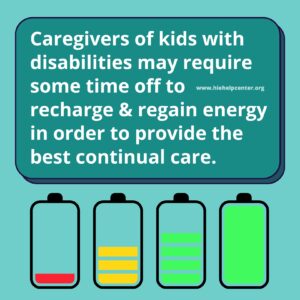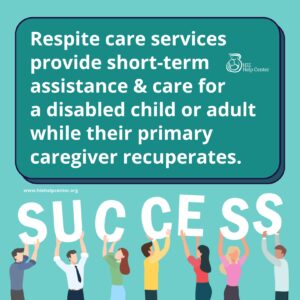Sometimes, when a parent is caring for a child in a home setting, they may require some time off to recharge and regain energy for continued care. For some parents, it can be difficult to find a family member with the qualifications or ability to look after the child to a desired level of care. When this happens, parents can look for respite care services, which provide short-term assistance (between a few hours to a few months, depending on the situation) and care for a child or adult with disabilities while the primary caregiver recuperates.
 Respite care can take place at the child’s home, or outside the home (in a community respite program, camp, group home, residential facility, or other setting).
Respite care can take place at the child’s home, or outside the home (in a community respite program, camp, group home, residential facility, or other setting).
Respite care service providers sometimes also provide other services, such as family counseling and support groups, training, and help with navigating medical care systems.
Finding respite providers can sometimes be difficult, but the National Respite Network has a respite provider locator that can help.
In-Home Respite Care vs. Out-of-Home Respite Care
There are benefits and detriments to different models of respite care, and the individual situation dictates which option may be better for any particular care recipient and caregiver.
 In-Home Respite Care
In-Home Respite Care
When a child receives in-home respite care, they remain in a comfortable and familiar environment, usually with a relatively intact routine or schedule. The care provider comes to the home, and needed equipment, medications and other items are already on-hand. Generally, in-home care may be less expensive than care outside the home. In-home care is often provided through a public health nursing agency, social service department, volunteer association a private agency or on an individual direct-hire basis.
Out-of-Home Respite Care
Out-of-home respite care can take place in a variety of settings, and provide the opportunity for the care recipient to have new experiences and have new social interactions. In some cases, respite care can be provided by a host family in a licensed group home, or in a more traditional residential facility.
Types of Places That Provide Respite Care
- Group homes
- Family care homes
- Host families
- Residential facilities
- Day care centers
- Licensed corporate ‘foster homes,’ where groups of individuals with disabilities are placed together in a home-like environment
- Short-term nursing homes
- Parent co-ops (cooperative programs), where parents exchange care services with each other for free
- Respitality programs (provided by United Cerebral Palsy), which provide families respite care in combination with recreational services
- Hospitals (for individuals with high care needs)
- Dedicated recreational and summer camps
Your child’s medical providers may know of local respite facilities that can help. In addition, you can ask families within your disability network to share the names of their child’s respite providers.

Funding
In many cases, out-of-home respite care is not covered by state or federal funding sources, and often comes out-of-pocket from family finances. In most cases, such services are offering on a sliding scale depending on financial circumstances and the intensiveness of care needed by the care recipient.
Additional Resources
- The American Psychological Association
- State Departments of Developmental Disabilities
- Caregiver.org, which provides a family care navigator
- Disability organizations, such as The Arc, United Cerebral Palsy or the United Way
- Local nursing or long-term care facilities
- Cincinnati Children’s Hospital provides a guide for determining what kind of respite care a child may need (acute vs. chronic illness care, etc.)
- The National Adult Day Services Association provides information on the respite care search in each individual state.

